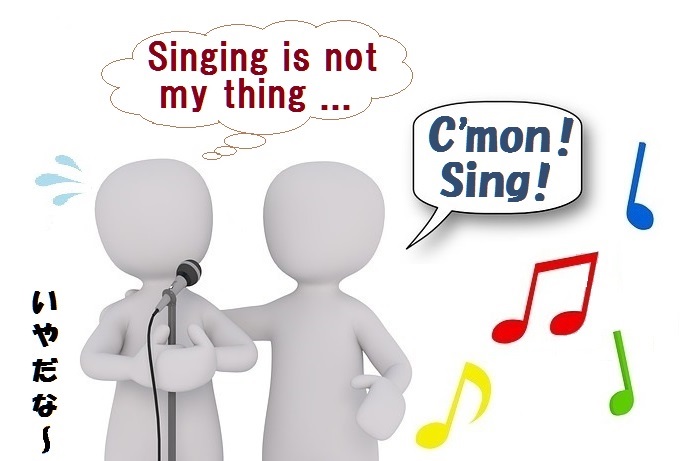It's not my thing.
2020/04/01
それは私の得意分野ではない。
<不得意>を示す時に使うカジュアル常套句。
口語として、下品さはないものの、正式な
言い方とも言えない。
「 得意じゃないから 」
くらいの感じ。
“it’s” は “it is” の省略形。
このように “is” の代わりに、その縮約形「 ‘s 」を
使うことが多い言い回しである。
◆ 表題には、主格の代名詞 “it”(それは) 及び
一人称所有格 “my”(私の)を選んだが、
これらに限られない。
すなわち、代名詞でなくてもよい。

—————-↑ 歌の苦手なケン
- “Singing is not Ken’s thing.”
(ケンは歌うことが得意でない。)
– - “Cooking is not my mom’s thing.”
(料理は母の得意分野ではない。)
– - “Art is not my thing.”
(僕は芸術に暗いから。)
– - “Reading is not Jane’s thing”
(ジェーンは読書が苦手です。)
ー - “Baseball is not his thing.”
(彼は野球は得意でない。)
さらに、複数でもよい。
- “Swimming and basketball are
not her things.”
(水泳とバスケは彼女の得意分野でない。)
– - “Kissing and hugging are not
my dad’s things.”
(キスしたりハグしたりすることは、
父は苦手。)
だが、通常は単数。
誰かの不得意分野をべらべら他言する機会など、
めったに生じないから当然であろう。
◆ このフレーズでポイントとなるのが “thing”。
“thing” は名詞のみで、可算名詞と不可算名詞
を兼ねる。
原則は可算名詞。
“thing” の 基本的意味は「物事」=「物」「事」
日本語の「物事」と同様、
抽象的・総称的な意味合いがある
日本語「もの」の指す内容が非常に広範で
あるように、”thing” のカバー範囲もすごい。
真面目な内容から猥談まで何でもござれ、
と言っても過言ではない。
例えば、男性器(penis、発音:ピーニス píːnis )
は、婉曲俗語で「モノ」= “thing” と称する。
日英で用途の重なることが多い名詞 “thing”。
表題 “It’s not my thing.” では、”thing” は
「得意なもの・こと」「好きなもの・こと」を示す。
よって、直訳は「それは私の得意なことではない」
または「~好きなことではない」。
これ以外にも、「これは私の物ではない。」
との一般的な意味もなすのは言うまでもない。
文脈で判別できるのが普通だが、私たち英語学習者
にとって、「不得意」については推測しがたい。
そのため、本稿で取り上げた次第である。
◆ 否定の副詞 “not” を抜いた “It is my thing.” なら、
「これは私の得意なこと」「~好きなこと」。
トークショーで、ホストがゲストに向かって
“What is your thing ? ” と尋ねた場合、
相手の興味を聞き出している。
- 「あなたの得意なことは?」
- 「あなたの好きなことは?」
さらには、 - 「今、はまっていることは?」
ここから話の糸口を引き出す流れである。
所有格(※)の直後に置く、この “thing” の意味合い
は昔から存在したが、インターネット時代に
入ってからより広まった用法だという。
※ one’s = my、your、his、her、our、your、their
次のサイトに詳しい。
“X isn’t really my thing” is a common formulation
used to express disinterest.
The nuance is different from dislike,
and is perhaps closest to “X bores me“,
but is softer.
“What is your thing?” is a playful response asking
what you are interested in.
https://ell.stackexchange.com/
※ 太字・赤字は引用者による
上掲サイトの説明通り、ニュアンスとしては
“dislike”(嫌い)というわけでは必ずしもない。
あくまで、興味がない、得意ではないということ。
よって、判断基準は好き嫌いではなく、<関心>
があるか否かという点である。
【類似表現】
“It’s not my forte.”
(それは私の得意分野ではない。)
“be somebody’s forte” =
to be something that you do well
or are skilled at.
(ロングマン、LDOCE6)※ 下線は引用者
< 名詞 “thing” の用法 >
“Things change.”
https://mickeyweb.info/archives/3326
(事情は変わる。)
“Things happen.”
https://mickeyweb.info/archives/9323
(こんなこともある。)
“talk things out”
https://mickeyweb.info/archives/5615
(徹底的に話し合う)
–
“work things out”
https://mickeyweb.info/archives/9698
(問題を解決する)
“Sort things out”
https://mickeyweb.info/archives/1464
(解決する。対処する。けりをつける。)
–
“get things going”
https://mickeyweb.info/archives/10469
(事を進める)
“first thing in the morning”
https://mickeyweb.info/archives/5059
(朝一番に)
“everyday things”
https://mickeyweb.info/archives/10909
(日常の物事)
“Do the right thing.”
https://mickeyweb.info/archives/1552
(正しいことをする。)
“The thing is – ”
https://mickeyweb.info/archives/17132
(要するに、実際には)
“Here’s the thing.”
https://mickeyweb.info/archives/18051
(こういうことなのです。)
【関連表現】
–
“in the zone”
https://mickeyweb.info/archives/12844
(極めて集中して絶好調な状態)
“be into – ”
https://mickeyweb.info/archives/22466
(〜に熱中する、~に夢中になる、~にはまる)
“hooked”
https://mickeyweb.info/archives/24272
(夢中になる、はまる、中毒になる)
“obsessed with – ”
https://mickeyweb.info/archives/26219
(~に取りつかれる、~で頭が一杯になる)